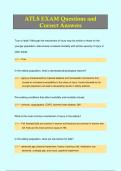ATLS EXAM Questions and
Correct Answers
True or false? Although the mechanism of injury may be similar to those for the
younger population, data shows increased mortality with similar severity of injury in
older adults.
✓✓~~ True
In the elderly population, what is decreased physiological reserve?
✓✓~~ aging is characterized by impaired adaptive and homeostatic mechanisms that
caused an increased susceptibility to the stress of injury. Insults tolerated by the
younger population can lead to devastating results in elderly patients.
Pre-existing conditions that affect morbidity and mortality include:
✓✓~~ cirrhosis, coagulopathy, COPD, ischemic heart disease, DM
What is the most common mechanism of injury in the elderly?
✓✓~~ Fall. Nonfatal falls are common in women and fractures are common in women who
fall. Falls are the most common cause of TBI.
In the elderly population, what are risk factors for falls?
✓✓~~ advanced age, physical impairment, history of previous fall, medication use,
dementia, unsteady gait, and visual, cognitive impairment
,Most of elderly traffic fatalities occur in the daytime and on weekends and typically
involve other vehicles. Why?
✓✓~~ Older people drive on more familiar roads and at lower speeds and tend to drive
during the day. Older people have slower reaction time, a larger blind spot, limited
cervical mobility, decreased hearing, and cognitive impairment.
True or False? Mortality associated with small to moderate sized burns in older
adults remains high
✓✓~~ True
Spilled hot liquids on the leg, which in younger patients may re-epithelialize due to
an adequate number of hair follicles, will result in a full thickness burn in older
patients.
✓✓~~ this is true
Airway-patients may have dentures that may loosen or obstruct the airway. If
dentures are not obstructing the airway, leave them in place for what?
✓✓~~ bag mask ventilation, as it improves mask fitting.
When preforming rapid sequence intubation, the dose of benzos, barbiturates, and
other sedatives should be reduced to what percentage to minimize the risk of
cardiovascular depression?
✓✓~~ 20-40%
,Functional changes in cardiac system include declining function, decreased
sensitivity to catecholamines, atherosclerosis of coronary vessels, increased
afterload, fixed heart rate (beta blockers)
✓✓~~ this results in lack of classic response to hypovolemia, risk for cardiac ischemia,
elevated BP at baseline, and increased risk of dysrythmias.
Functional changes in pulmonary system include decreased elastic recoil, reduced
residual capacity, decreased gas exchange and decreased cough reflex
✓✓~~ thus they are at increased risk for respiratory failure, increased risk for pneumonia,
and poor tolerance to rib fractures
Functional changes in renal system include loss of renal mass, decreased GFR, and
decreased sensitivity to ADH and aldosterone
✓✓~~ resulting in drug dosing for renal insufficiency, decreased ability to concentrate urine,
increased risk for AKI and urine flow may be normal with hypovolemia
Functional changes to MSK include loss of lean body mass, osteoporosis, changes
in joints and cartilage, c spine degenerative changes and loss of skin elastin and
subcutaneous fat
✓✓~~ resulting in increased risk for fractures, decreased mobility, difficulty for oral
intubation, risk of skin injury, increased risk for hypothermia, challenges in
rehabiliation
Functional changes in Endocrine system include decreased production and
response to thyroxin and decreased dehydroepiandrosterone (DHEA)
, ✓✓~~ resulting in occult hypothyroidism, relative hypercortisone states and increased risk of
infection
True or false: Arthritis can complicate the airway and cervical spine. Patients can
have multilevel degenerative changes affecting disk spaces and posterior elements
associated with severe central canal stenosis, cord compression, and myelomalacia
✓✓~~ true
In elderly population, due to their changes in pulmonary system, placing a gauze
between gums and cheek to achieve seal when using bag valve mask ventilation is
okay. In addition, because aging causes a suppressed heart rate response to
hypoxia......
✓✓~~ respiratory failure may present insidiously in older adults.
Age related changes in the cardiovascular system place the elderly trauma patient at
significant risk for being inaccurately categorized as hemodynamically stable.
✓✓~~ Elderly patients have a fixed heart rate and fixed cardiac output, thus, their response
to hypovolemia will involve increasing their systemic vascular resistance.
Furthermore, since older patients have HTN, an acceptable BP may truly reflect a
hypotensive state. A systolic BP of 110 is to be utilized as the threshold for identifying
hypotension in patients 65 and older.
Do no equate blood pressure with shock in older patients
✓✓~~ BP in older patients may look normal due to the medications they are on. Use lactate
and base deficit to evaluate for evidence of shock




